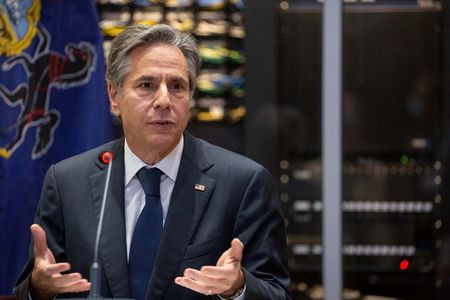
U.S.’ Blinken talks European security cooperation with France’s Macron

By Simon Lewis and Richard Lough
PARIS (Reuters) -U.S. Secretary of State Antony Blinken and French President Emmanuel Macron on Tuesday discussed a French push for more security cooperation among European nations, a U.S. official said during a visit to try to repair a rift with Paris.
The top U.S. diplomat is in Paris seeking to rebuild ties after a security pact between the United States, Australia and Britain resulted in Canberra scuttling a defence contract, initially valued at $40 billion, for French submarines. Blinken told Macron that Washington was “certainly supportive of European defence and security initiatives” that can increase capabilities but do not undermine the NATO alliance, a senior U.S. State Department official said. “We view that as a complement to NATO and the president’s (Joe Biden’s) commitment to NATO, as you all know, is ironclad,” the official said.
French officials have emphasised that AUKUS was a wake up call for EU states and that they should respond to the recent crisis between Paris and Washington by ending the bloc’s naivety when it comes to defending its interests and building its own military capacity within the NATO framework.
Macron affirmed to Blinken that France agreed any new initiative should not be in competition with NATO, according to the U.S. official, who briefed reporters in Paris after Blinken met Macron, Foreign Minister Jean-Yves Le Drian and Macron’s diplomatic adviser Emmanuel Bonne.
Le Drian had taken Blinken on a walking tour of the Ministry for Europe and Foreign Affairs at Quai d’Orsay lasting more than an hour before the pair sat down for a meeting. Blinken then met Macron for 30-40 minutes at the presidential Élysée Palace, where he also spoke separately with Bonne. Blinken later attended meetings of the Organisation for Economic Cooperation and Development in Paris.
DIPLOMATIC RIFT
The French government has said it was stabbed in the back by its close allies over the nuclear-powered submarine deal – part of the so-called AUKUS security pact between the United States, Australia and Britain announced on Sept. 15 – and the wounds would take time to heal. France briefly withdrew its ambassador to the United States over the affair, before Macron and U.S. President Joe Biden spoke by phone and agreed to hold in-depth consultations.
The official described Blinken’s meetings with French officials as “very cordial and amicable” and focused on future cooperation rather than “relitigation” of the AUKUS spat. Blinken also discussed French proposals for more security and counterterrorism cooperation in the Sahel region of West Africa, the U.S. official said, adding that Washington was still reviewing those proposals.
The official declined to give specifics of what might be agreed, saying that Blinken’s discussions would “tee up” a meeting later this month between Biden and Macron, the details of which are yet to be announced. Blinken, who was not initially expected to meet Macron during the visit, found the meeting “very positive”, the official said.
“President Macron reiterated that, you know, let’s turn this into an opportunity to deepen and strengthen cooperation and coordination, from the Euro-Atlantic to the Indo-Pacific to Africa,” the official said, adding that both sides agreed there was still a lot of work to do on the relationship.

















POST COMMENTS (0)